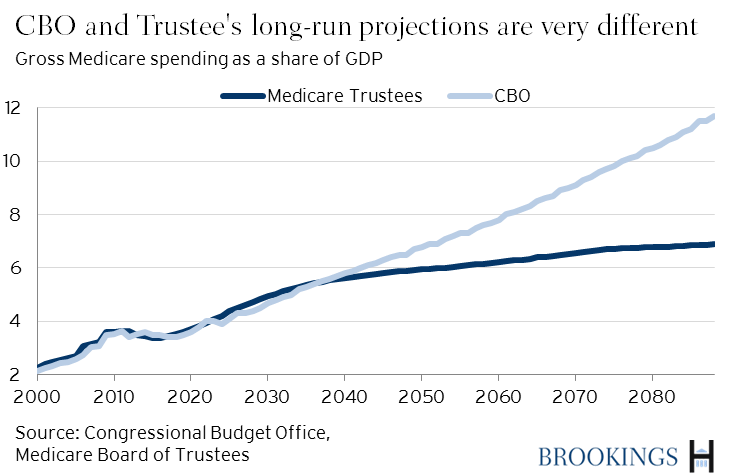Recent projections for Medicare spending from the Centers for Medicare and Medicaid Services (CMS) and Congressional Budget Office (CBO) are virtually identical through 2040, and both agencies’ projections for spending have fallen dramatically in recent years. But beyond 2040, the projections diverge. CBO, for example, projects that health spending will reach 10.5 percent of GDP in 2080, a full 3.7 percentage points higher than in CMS’s baseline projections.

What explains these dramatically different projections? Simply put: different assumptions. Both agencies assume that private health spending will slow over time, reflecting the notion that households will not want to forever curtail other types of consumption in order to afford ever-greater health consumption. But CBO and CMS make very different assumptions about Medicare over the long run. CBO assumes that without changes to Medicare policy, Medicare will be unable restrain health spending growth as effectively as the private sector. Hence, CBO assumes that Medicare will grow faster than private health spending in the long run. CMS, on the other hand, assumes that the ACA’s cuts are deep enough that Medicare spending will rise slower than private health spending.
It is impossible to know which of these projections is “better.” Health economists know that health spending can’t rise faster than GDP forever, but we know little about how much health spending will be viewed as “too much.” Thus, we have no way to pin down the trajectory of private health spending over the long run. And the idea that we can say something useful about Medicare spending vs private health spending over 75 years is fanciful at best.
It’s not that CBO and CMS are doing bad projections—it’s that it is impossible to do a meaningful 75-year projection for health spending. CBO’s recent emphasis on the 25-year outlook, and its de-emphasis on the longer-run outlook, makes a lot of sense.
The Brookings Institution is committed to quality, independence, and impact.
We are supported by a diverse array of funders. In line with our values and policies, each Brookings publication represents the sole views of its author(s).



Commentary
Dueling Long-Term Projections Highlight Uncertain Trajectory for Health Care Costs
July 29, 2014